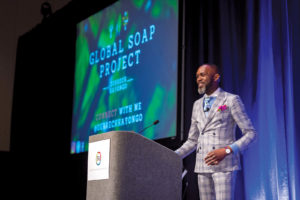Despite the hurricanes and wildfires of late summer, IFAI Expo 2017 attracted many new first-time attendees to New Orleans in late September. And exhibitors reported that attendees were more likely than previous years to purchase their products, services and equipment. Aside from exhibitor-attendee interaction, the show floor was a hive of lively “campfire” educational sessions and popular activities related to advanced textiles.
In New Orleans, industry leaders were talking about a lot of things: innovation to drive new products and sales, the best ways to customize their products, how to hire and train new employees, and what sustainability looks like in their operations. Despite the emphasis on “What’s new?,” two persistent, “traditional” themes came up repeatedly in educational sessions: 1. Know your customer; and 2. Strive for quality.
Wednesday’s keynote
Derreck Kayongo, founder of the Global Soap Project and CEO of the Center for Civil and Human Rights, was the keynote speaker September 27 at IFAI Expo 2017.
Dressed in a dapper plaid suit, Kayongo described how in 1979, at the age of 10, his parents had to flee Uganda, and his privileged life changed overnight, as his family eventually settled in the U.S.
His first night in an American hotel, he found three bars of soap. He took two bars. The next day, three more bars appeared. When he tried to return the two bars, the concierge laughed and told him it was free.
According to Kayongo, 800 million bars of soap are thrown away every year, yet in some countries children drop out of school because of illnesses caused by lack of sanitation.
When Kayongo decided to start his soap recycling business, he had to get past the “yuck factor” of killing germs in used soap. “All businesses have a yuck factor. If you can deal with the yuck factor, you’ll be successful,” said Kayongo.
The soap is scraped, frozen, crushed, processed, packaged and shipped. As a result, infection rates have dropped significantly in areas served by the Global Soap Project; in Malawi, infection rates reportedly dropped from 90 percent to 40 percent.
Americans read a lot of self-help books, remarked Kayongo. He has his
own definition for SELF:
• Service to others
• Education to learn about other cultures and customs
• Leadership to humble oneself to keep failing and learning
• Faith in your ideas and employees
His business philosophy: Don’t seek perfection. Seek balance, consistency, justice and a passion to help humanity.
The Greater Good
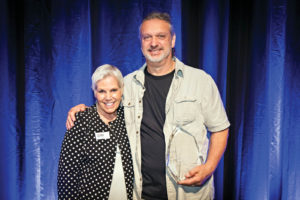
Scott Massey, owner of Awning Cleaning Industries/APCO Products in New Haven, Conn., was awarded the first-ever Greater Good Award at IFAI Expo 2017.
The award recognizes his company’s commitment to grassroots recycling and repurposing of fabrics. And for a number of years now—including this year—
his company has produced the IFAI Expo bags handed out at the show.
The Greater Good Award focuses on an IFAI member company that does good business—and strives to be a good neighbor, good citizen and good partner. The Review reports a “Greater Good” story each month; to read about Scott Massey’s company visit www.specialtyfabricsreview.com.
Manufacturing for Good: in the bag
The Manufacturing for Good booth at IFAI Expo 2017 was a popular location on the show floor—and a first for IFAI Expo! Exhibitors contributed supplies, equipment and labor to sew 70 large duffel bags for young people who receive services at Raintree Children and Family Services, a nonprofit that works with at-risk youth and children in the greater New Orleans area.
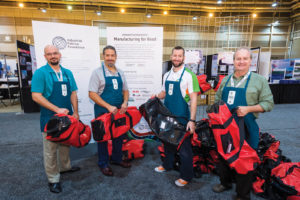
This program was made possible through the efforts of numerous companies. Equipment and supplies were donated by Autometrix, Fil-Tec, Forsstrom, Juki Smart Solutions, JTE Machine Systems, Miller Weldmaster, Snyder Manufacturing Inc., Vertilux and YKK. Donors included Boat Bright Custom Canvas, Kretzer Scissors Inc., Porcupine Canvas Manufacturing Ltd. and Wyoming Canvas. The booth was hosted by IFAI’s Equipment and Makers Divisions, supported by the Industrial Fabrics Foundation and sponsored by the Marine Fabricators Association.
Rewarding innovation
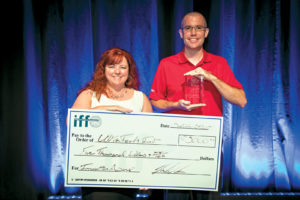
The Industrial Fabrics Foundation (IFF) chose UltraTech International Inc., Jacksonville, Fla., as this year’s winner of the 2017 Innovation Award, in the category of “Chemicals, Coatings and Compounds” with the EverShield® C6 water-based fabric treatment. The company was awarded a prize of $5,000.
Honorable Mention awards went to these companies in five other categories:
1. SUREFAS® B.V., for the CAF-Composite Screw Stud (Hardware and Findings)
2. TRI Environmental Inc., for the Commercial Electrical Leak Location
Equipment (Equipment and Tools)
3. digiShapes, for its Digital Boat Covers (Services to Manufacturers)
4. Infinity Canopy Inc., for the Infinity Canopy Modular Slide-on Wire Shade System (End Products)
5. Polartec, for Polartec® Delta™ (Fabrics, Fibers and Films)
The IFF is a nonprofit 501(c)(3) organization dedicated to education and research in specialty fabrics. For information, visit www.ifai.com/industrial-fabrics-foundation.
Recognizing Excellence
For more than 70 years, IFAI’s International Achievement Awards (IAA) competition has acknowledged innovation and excellence in design and fabrication. This year’s winners were selected based on project complexity, design, workmanship, uniqueness and function. We received a total of 235 entries from 11 countries.
Seven AOE recipients were also chosen as “Best in Category” winners: Fabric Structures: Comercial Industrial Delta SA (CIDELSA), Lima, Peru; Awnings and Canopies: J. Miller Canvas Inc., Santa Ana, Calif, USA; Fabric Environments: Fabric Images Inc., Elgin, Ill., USA; Marine Fabrication: David’s Custom Trimmers, Wakerley, Queensland, Australia; Tent Rental and Manufacturing: Fiesta Tents Ltd., Saint-Laurent, Quebec, Canada; Geosynthetics: ACE Geosynthetics Inc., Taichung City, Taiwan; Advanced Textiles: Coppins Sea Anchors Ltd., Motueka, New Zealand.
Detailed product descriptions and photos of all 2017 IAA winners will be posted at https://iaa.ifai.com.
Thursday’s keynote
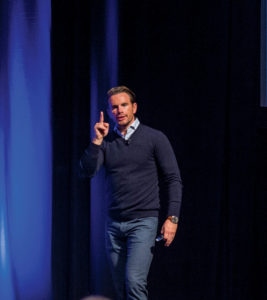
Are you ready for 2020?
“We’ve been living by the traditional unwritten rules of success: start at the bottom, work hard, respect the chain of command and don’t share information freely. But today, sharing information is how you get more power,” said keynote speaker Seth Mattison, an expert on workforce trends and generational dynamics. “The primary challenge is bringing a network mentality into hierarchical companies.”
According to Mattison, founder of FutureSight Labs, the new world of networking has created two transformational shifts in the business world. “The first is unprecedented access to information. There’s so much information for us to sift through now, and we’re all aware that much of it is misinformation and ‘alternative facts,’” says Mattison. “You need to make transparency and openness a priority. Closed-door meetings lead to whispers and unease. People would rather hear bad news than no news.”
The second shift is the exponential reach of information. “Anyone can put forth an idea that resonates,” said Mattison. “This goes against the ‘pay your dues’ mentality. Nobody needs permission to be influential. Young people may have the best ideas, and it’s not about perfection, it’s about innovation.” The traditional mindset of perfection limits growth. “Take a good look at how you treat mistakes in your business. Do you punish people? Do you allow mistakes? How do you treat people who ask a lot of questions? You can’t innovate without asking questions,” Mattison noted.
Mattison recommends that business leaders question their “sacred cows” and determine where traditional structures, communication processes and culture are constraining growth. “Customer experience is a reflection of culture, and culture is a reflection of leadership.”
Balancing Business Opportunities
The health and viability of a business depends on juggling dozens of factors. Business owners and managers who attended IFAI Expo 2017 had many educational opportunities to learn about the soft and hard skills that keep customers coming back and employees feeling valued. Whether a business owner is considering an investment in automated equipment or seeking a new customer base, Expo presenters gave attendees advice based on real world experience and current trends.
Partnering with architects
Want to do more business with architects? Mary Gilmore, AIA, National Council for Interior Design Qualification (NCIDQ), and Mark Shellshear, Director of Sales–Structure Fabrics for Value Vinyls Inc., shared tips during their session “How to Build Relationships with Architects.”
“Architects are very busy. Cold calls don’t work. They are very visual; they need pictures,” said Gilmore. A good website with quality photos of projects is important, and shade business owners can get their foot in the door by dropping off product literature and samples. If possible, provide project specs for the architects to save time and effort.
Shellshear reviewed the types of fabric structures that exist, including air-inflated, frame-supported, tensile and retractable, and also reviewed the components, fabrics and uses of each application. “Design usually starts with the architect,” he noted. It’s very important to have a relationship with an architect, so they understand what fabric can and cannot do.”
Both Gilmore and Shellshear mentioned that it’s important to know one’s business audience; in other words, understand what an architect specializes in, then bring project photos that align with that specialty. And don’t forget to tell the story behind the project.
Asset protection
Larry Oxenham, senior advisor with the American Society for Asset Protection, advised attendees that small business owners need an effective succession strategy that addresses the following threats to wealth:
• Lawsuits—Prevent lawsuits rather than win them by allocating assets properly.
• Taxes—Most businesses pay too much in taxes because they are not using a Limited Liability Company (LLC) structure effectively.
• Probate and Estate Taxes—Standard wills are not the right choice. Funnel funds through a Revocable Living Trust with a will inside of it to eliminate the probate process.
“Small businesses need to use the same strategies as larger players,” said Oxenham. Business owners need to make sure their accountants are using strategies that take advantage of the existing tax code to effectively allocate and protect assets during the life of their businesses, and beyond.
Working with engineers
Mike Sullaway, principal engineer, president and owner of Sullaway Engineering Inc. in San Diego, Calif., presented a campfire session “Working with Engineers.” Throughout the presentation, he offered tips and advice on the best ways to go about working on a project with an engineer.
How to find your engineer: referrals (look for projects similar to the one on your agenda); Google to see what firms are located in your region; contact your
local Chamber of Commerce for a list of engineers and their credentials; connect with associations such as IFAI and ASCE.
How to qualify your engineer: Check with your city government to see if your work needs a consent or if it will conflict with any local bylaws; determine the type of engineer you will need (structural, geotechnical, civil engineer, etc.); inquire about licenses the engineer holds; look over the engineer’s professional portfolio.
How to partner with your engineer: communicate what you want and look for an engineer who is committed; review the engineering firm’s policies and procedures; define the scope of the project; discuss contracts.
Engaged employees
According to Barry Adams, president of Peach Tree Awnings in Norcross, Ga., “The reason people separate from their company is because they feel their contribution is not valued, and they feel what they do isn’t making a difference.” Adams’ session, “How to Keep Talented Employees Engaged,” focused on ways to retain and engage talented key associates in a company.
Adams offered 10 “C’s” on employee engagement:
1. Connect (Manage by walking around.)
2. Career path (Do people know where they’re going?)
3. Clarity (Is there a clear vision and are there goals?)
4. Communicate/convey (Are you giving regular feedback?)
5. Celebrate/congratulate (Encourage the heart.)
6. Contribute (Do employees see a connection between their work,
customer service and the company’s success?)
7. Control (Do employees help in decision making?)
8. Collaborate (Is there trust and cooperation?)
9. Credibility (Are there high ethical standards?)
10. Confidence (Are employees proud to wear the company colors?)
I’m with the government …
Mary Lynn Landgraf, senior international trade specialist for the U.S. Department of Commerce/OTEXA, shared tips for textile industry business owners looking to pursue government contracts.
The first step in securing a government contract is registering in the System for Award Management (SAM). This is a free service and no outside agency is needed to register with SAM.
From there, companies can register with the General Service Administration (GSA), where small businesses make up 36 percent of sales.
“Buy American” is an important government initiative. Textile companies are already familiar with the Berry Amendment, which stipulates that the industrial base is kept in the U.S. during times of war.
OTEXA can match companies to military needs; and keeping your eyes on innovation is key.
Success across markets
Whether you’re a fabricator for the marine, automobile, commercial or residential markets, Steven Wayne, owner of Southern Stitch Canvas and Upholstery LLC in Gulfport, Mississippi, says business success comes down to four things: skills mastery, excellent communication, judicious customization and customer education. “It’s really about knowing your customers, spending time with them, listening to them, presenting options based on their goals and then guiding them to the right solutions,” said Wayne.
During a presentation on advanced upholstery techniques, Wayne attributed most failures to a lack of communication. “Careful communication prevents surprises—for both the customer and the fabricator.” He recommends using visuals such as small physical models as well as digital representations of the project.
Cutting room automation
Weighing the benefits against the costs of cutting room automation depends on your perspective, said Thomas Carlson, manager of Carlson Design.
“I had one new client say to me recently, ‘The ROI was my kneecaps this year.’”
Panelists James Herstein, sales manager for Matic S. A., Chandler Clark, owner of Signature Canvas Makers, and Jonathan Palmer, owner
of Autometrix Inc., agreed that the benefits of cutting room automation include an increase in productivity, accuracy and consistency, as well as a reduction in the need for skilled workers. “All of your patterns are in the computer,” says Palmer. “You just need someone to load the file and push go—the machine does the rest of the work.”
The panelists also agreed, however, that 2-D digitizing is a required entry point to the 3-D world—and that there’s a significant learning curve to working with automated cutting machines.
Choosing the right sewing machine
Panelists from the presentation “Selecting a Sewing Machine for Your Application” agreed that nearly any project can at least be partially fabricated using a single-needle walking foot machine. “But for wide material for tents, awnings, covers, sails and the like,” said Steven Kaplan, president of Kaplan Sewing Machine, “a long-arm sewing machine is the better choice.”
Mike Sandercock, The Quality Thread and Notions Company, advised that needles and threads are a major consideration that can impact a sewing machine in a shop. “Depending on the fabric, your needle size and thread tension can affect the way your machine operates,” he added.
Although there are automated features that fabricators can add to existing machines, Warren Shannon, Mitsubishi Electric Automation, pointed out that buying a new automated sewing machine for your shop can make even more sense. “Automated machines are becoming more popular because they allow less skilled operators to complete successful projects,” he noted.
Features such as needle positioning, back-tacking and thread trimming are available on programmable models. Programmable machines are also equipped with servo motors, which are quieter, generate less heat and provide better speed control than traditional clutch motors.
Mario Gauna, Henderson Sewing Machine, said the automated machines run the gamut from simple to complex. “A good dealer will ask for samples of what you’re doing to understand your processes so they set up your machinery properly.”
The panelists urged fabricators to take advantage of the rich sources of information around them. “That’s one of the great things about IFAI’s Expo,” said Kaplan. “Here’s a tremendous group of knowledgeable people who love to answer questions. You can walk around and find things you never knew existed.”
Contract sewing success
Getting a contract sewing job is great, but making sure a customer’s needs align with one’s business capabilities is a key consideration, according to Chad Miller, director of contracting at American National Manufacturing. Miller’s presentation highlighted the numerous questions that need to be answered before agreeing to make
a customer’s product, including:
• Do I have the right equipment, time, space and talent to produce the product?
• What is the customer’s timeline?
• Are the materials available in the timeframe?
• What supply chain issues might be encountered?
Miller uses a Project Input Sheet to standardize his early discussions with potential customers who seek his contract sewing services. This document helps him discover what industry the product will be used in, an especially important factor since there may be safety standards to take into consideration.
 As the exhibit hall closed on Wednesday, attendees formed a New Orleans-style parade from the Ernest N. Morial Convention Center to the National World War II Museum, to enjoy refreshments and a tour of exhibits that cover the epic scale of a war that changed the world. The industry played in more than one sense, with a special appearance by the band “Hangin’ by a Thread”: Steve Angelone (Bruin Plastics), drums and vocals; Eric Brown (BondCote), guitar and vocals; Dennis Bueker (Keyston Bros.), guitar; Mark Deal (Deal Rite), bass; Michael Woody (Trans-Tex), vocals; and Craig Zola (Herculite), guitar and vocals.
As the exhibit hall closed on Wednesday, attendees formed a New Orleans-style parade from the Ernest N. Morial Convention Center to the National World War II Museum, to enjoy refreshments and a tour of exhibits that cover the epic scale of a war that changed the world. The industry played in more than one sense, with a special appearance by the band “Hangin’ by a Thread”: Steve Angelone (Bruin Plastics), drums and vocals; Eric Brown (BondCote), guitar and vocals; Dennis Bueker (Keyston Bros.), guitar; Mark Deal (Deal Rite), bass; Michael Woody (Trans-Tex), vocals; and Craig Zola (Herculite), guitar and vocals.
 TEXTILES.ORG
TEXTILES.ORG



